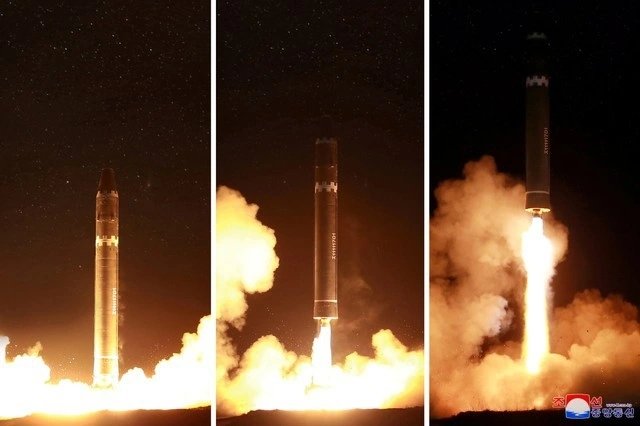
Are North Korean missiles really dangerous to passenger planes? 0
(Dan Tri) – The fact that the crew of a Cathay Pacific plane saw an object suspected to be a North Korean missile flying over an area near Japanese airspace last week raised many concerns about the risk of aviation safety.
North Korea’s Hwasong-15 missile left the launch pad on November 29 (Photo: Reuters)
On November 29, North Korea launched an intercontinental ballistic missile (ICBM) that flew 4,475 km high and 950 km away for 53 minutes before falling into the Sea of Japan.
Although many opinions are concerned about the risk of North Korea’s ICBM missiles hitting passenger planes and causing heavy damage, some experts believe that this risk is not too serious.
Dr Malcolm Davis, senior defense strategy and capabilities analyst at the Australian Strategic Policy Institute, said the odds of a collision between a passenger jet and an ICBM after liftoff were “incredible.”
Agreeing with Dr. Davis, expert Neil Hanford from the consulting firm Strategic Aviation Solutions said that the collision rate between ICBM missiles and passenger aircraft is very low.

Japanese television reported on North Korea’s missile launch on November 29 (Photo: Reuters)
According to Mr. Davis, after the North Korean ICBM missile is launched, countries always have a way to calculate where the missile will fall.
“Basically, air traffic control agencies will monitor the movements of all aircraft.
Mr. Davis said that passenger planes would not be able to operate `recklessly` and without taking into account what is happening around them.
However, experts say that the threat posed by North Korean missiles to passenger aircraft still exists, although not much.
The airspace area on the east coast of Japan in the Pacific Ocean is one of the important air routes with hundreds of flights every day traveling between Asia and North America.
According to Mr. Jeremy, North Korea’s missile launches have an impact on aviation safety, accordingly, the aviation security agencies and civil aviation departments of the countries should establish a council to link stakeholders.
Success
Synthetic





